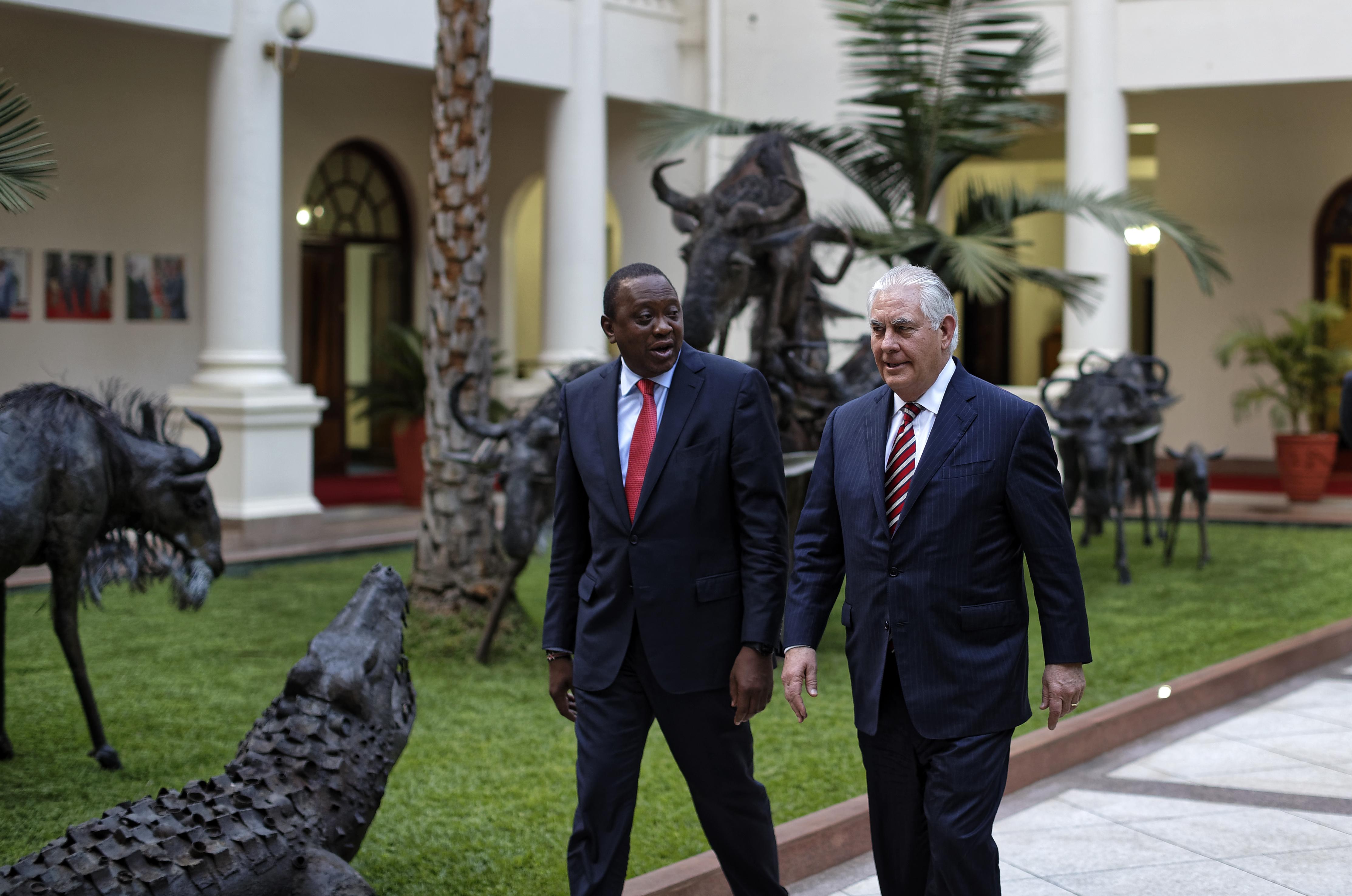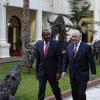
A bitterly contested presidential election appeared to be setting up a violent rerun of clashes between President Uhuru Kenyatta and longtime rival Raila Odinga. But an unexpected detente between the
NAIROBI, Kenya | A bitterly contested presidential election appeared to be setting up a violent rerun of clashes between President Uhuru Kenyatta and longtime rival Raila Odinga. But an unexpected detente between the two has some hoping Kenya can avoid the partisan and tribal bloodshed that has marred past electoral crises.
An unexpected calm has settled on most of the country after Mr. Kenyatta and Mr. Odinga agreed to work together to heal divisions arising from last year’s general elections.
The followers of Mr. Odinga, in his third bid for the presidency and his second race against Mr. Kenyatta, had vowed never to accept the results of a chaotic pair of votes that gave Mr. Kenyatta another five-year term. They insisted that government election officials had rigged the results.
Odinga supporters in January staged a mock inauguration for their candidate in central Nairobi. The government allowed the ceremony to proceed but blocked any national television coverage of the event and cracked down on politicians who took part.
Two months later, shoppers are back in the markets and traffic fills the streets of the capital and other major towns that experienced sporadic chaos, violence and demonstrations since the first vote in August. Banks, hotels and foreign exchange bureaus are open for business as well.
In the lakeside city of Kisumu, an opposition stronghold where more than 50 people died in civil unrest, banks, hotels and fishmongers who work on the banks of Lake Victoria are once again busy. Security officials have removed boulders that protesters used to block roads.
“Life is now getting better,” said Eunice Achieng, a mother of five who sells fish in Kisumu. “We support the dialogue between President Uhuru and Raila because it’s bringing peace in this region. Business is now picking up well. You can see me readying my wares for the day.”
Kenya has been in limbo since the original presidential results were nullified on Sept. 1 because of what the Supreme Court called “irregularities and illegalities” in the electronic transmission of results. The court ordered a rerun, which Mr. Odinga boycotted, saying Mr. Kenyatta needed to revamp the electoral commission before a new vote.
Mr. Kenyatta won the second ballot with 98 percent of the vote, though less than a third of the electorate went to the polls, according to the electoral commission. The Supreme Court upheld Mr. Kenyatta’s victory, sparking violent protests among Odinga supporters.
Human rights groups estimated that 100 people died in election-related violence since the initial vote.
As the crisis worsened, the international community put pressure on the two longtime rivals to strike a deal. Led by U.S. Ambassador Robert Godec and U.K. envoy Nic Hailey, diplomats pushed for dialogue to put the country back on the right track.
“As partners, we will do all we can to help, but only Kenyans can resolve the country’s problems,” they said in February, a week before then-U.S. Secretary of State Rex W. Tillerson arrived in Nairobi. “We again call for an immediate, sustained, open and transparent national conversation involving all Kenyans to build national cohesion, address long-standing issues and resolve the deep-seated divisions that the electoral process has exacerbated.”
Tillerson’s role
Mr. Kenyatta and Mr. Odinga met on March 9 — the day Mr. Tillerson arrived in Nairobi — and declared they would work together to unite the country. It was one of Mr. Tillerson’s last official acts before President Trump dismissed him.
“Leaders must come together to discuss their differences and what ails the country, like ethnic divisions,” Mr. Kenyatta said at a joint press conference with Mr. Odinga. “We have a responsibility to discuss and find solutions that will bind, unify and give a life cycle beyond the five years we have given ourselves. Elections come and go, but Kenya will remain.”
His rival similarly appealed to Kenyan patriotism.
“We refuse to allow our diversity to kill our nation,” Mr. Odinga said. “We need to save our children from ourselves. My brother and I have come together to say this dissent stops here.”
The two shared a handshake in a gesture that has sparked a cottage industry of analysis over how firm, sincere and frank the clasping of hands appeared. Both men, especially Mr. Odinga, have faced a wave of skepticism in the days since over whether the political reconciliation was real and what backroom deals may have been cut.
“The public camaraderie among Kenyan political leaders is just that — nothing more,” Sam Kanau, a lecturer at the Graduate School of Media and Communications at the Aga Khan University, told the Kenyan daily Star newspaper last week. “It means the underlying issues like feelings of exclusion, extreme poverty and electoral injustice will remain buried and unaddressed.”
Mr. Odinga denied that any secret deals had been cut and pointed to an even more unlikely diplomatic pairing to justify his move.
“What is wrong if Raila Odinga talks with President Kenyatta? It is the trend the world over,” the opposition leader told reporters after attending a church service over the weekend. “Even President Donald Trump is contemplating meeting North Korean leader Kim Jong-un.”
The ethnic hatred between Mr. Odinga’s Luo tribe and Mr. Kenyatta’s Kikuyu tribe dates back to the colonial period. The fathers of the two candidates were allies in the struggle for Kenya’s independence from British colonial rule and then became political adversaries. The sons extended the family rivalry into the country’s ethnic allegiances.
Now, observers say, the two leaders’ move could provide an unexpected force for stability in the country and, most important, the economy.
“The unity between two leaders is for the benefit of Kenyans,” said Peter Wafula Wekesa, a political analyst from Kenyatta University in Nairobi. “It will bring unity among the tribes and stabilize the economy. The shilling has gained against the dollar, and the stock market is also recovering.”
But Bonface Mwangi, who is involved in social-political activism through his initiative Team Courage, said the unity pact could give license to the opposition to receive ill-gotten benefits and not serve as a watchdog over the government’s rampant corruption and poor performance.
“Will Raila continue to call out Uhuru on corruption, disregarding court orders and police brutality?” he asked. “Will Raila demand electoral justice, compensation for the victims killed by police in peaceful protests, or will he keep quiet?”
Ms. Achieng said those fears were overblown. It’s time for Kenyans to come together and reconcile after a long political season, she said.
“We need to forgive each other and live together,” she said. “People from other tribes had to flee this region because of fear of attack. We should support Uhuru and Odinga’s move to bring peace here.”






